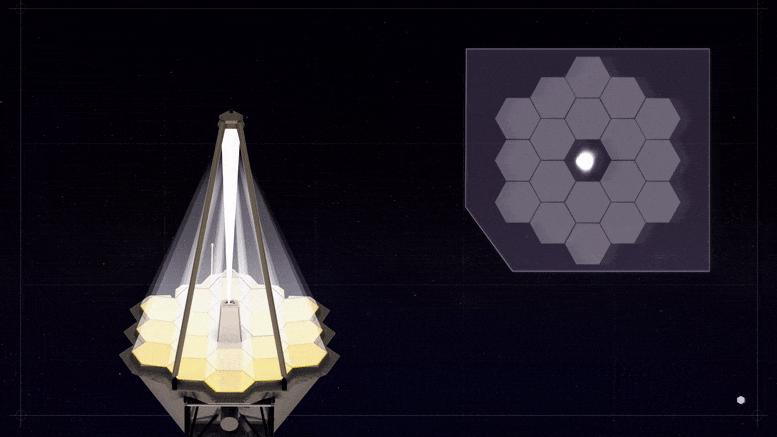The James Webb Space Telescope is nearing completion of the first phase of the months-long process of aligning the observatory's 18-segmented primary mirror.
The alignment was done using the Near Infrared Camera (NIRCam) instrument.
The observatory looked at a single star deliberately rendered 18 times into a hexagonal shape.
Each of Webb's 18 primary mirror segments captured the same star as unique dots, which will ultimately be aligned into a single, sharp focus. But the interim result portrays a star repeated perfectly in a hexagonal pattern reminiscent of a stunning celestial snowflake.
"The result is an image mosaic of 18 randomly organised dots of starlight, the product of Webb's unaligned mirror segments all reflecting light from the same star back at Webb's secondary mirror and into NIRCam's detectors," NASA said in a blog post.
The team will gradually adjust the mirror segments in the next month until the 18 images become a single star.

During the image capturing process that began February 2, Webb was repointed to 156 different positions around the predicted location of the star and generated 1,560 images using NIRCam's ten detectors.
AdvertisementThe entire process lasted nearly 25 hours, but the observatory could locate the target star in each of its mirror segments within the first six hours and 16 exposures.
These images were then stitched together to produce a single, large mosaic that captures the signature of each primary mirror segment in one frame.
"This initial search covered an area about the size of the full Moon because the segment dots could potentially have been that spread out on the sky," said Marshall Perrin, deputy telescope scientist for Webb and astronomer at the Space Telescope Science Institute.
"Taking so much data right on the first day required all of Webb's science operations and data processing systems here on Earth working smoothly with the observatory in space right from the start. And we found light from all 18 segments very near the centre early in that search! This is a great starting point for mirror alignment."
Moving forward, Webb's images will only become more apparent, more detail-laden, and more intricate as its other three instruments arrive at their intended cryogenic operating temperatures and begin capturing data.
The first scientific images are expected to be delivered to the world in the summer. Till then, there is much to be done in the coming months to prepare the observatory for entire scientific operations using all four of its instruments, NASA said.
**
The above article has been published from a wire agency with minimal modifications to the headline and text.









